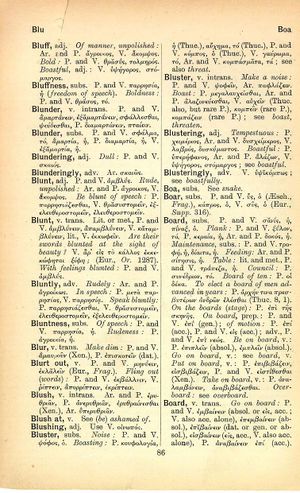boa: Difference between revisions
ῥᾴδιον φθείρειν φαρμακεύσεσιν ἢ ἀποτροπαῖς ἢ καὶ κλοπαῖς → easy to spoil by means of sorcery or diverting or theft
m (Text replacement - "]]>" to "]]") |
(D_2) |
||
| Line 6: | Line 6: | ||
{{Lewis | {{Lewis | ||
|lshtext=<b>bŏa</b>: (also bŏva in the MSS. of Pliny and [[Festus]]), ae, f. bos; cf. [[βουβών]],<br /><b>I</b> a [[large]] Italian [[serpent]]: in Italiă appellatae bovae in tantam amplitudinem exeuntes ut divo Claudio principe occisae in Vaticano [[solidus]] in alvo [[spectatus]] [[infans]], Plin. 8, 14, 14, § 37; 30, 14, 47, § 138 sq.; Sol. 2; acc. to Paul. ex Fest. p. 30 Müll., a [[water]]-[[serpent]], so called [[because]] it milked cows, Sol. 2, 33; or [[because]] it could [[swallow]] an ox, quas boas vocant, ab eo [[quod]] tam grandes sint ut boves gluttire soleant, Hier. Vit. Hil. Erem. 39.—<br /><b>II</b> A [[disease]] producing [[red]] pustules, the measles or [[small]]-pox, Plin. 24, 8, 35, § 53: boam id est rubentes papulas. id. 26, 11, 73, § 120: boas fimum bubulum abolet: [[unde]] et [[nomen]] traxere, id. 28, 18, 75, § 244; Lucil. ap. Fest. s. v. [[tama]], p. 360 Müll.—<br /><b>III</b> Crurum [[quoque]] [[tumor]] viae labore [[collectus]] [[bova]] appellatur, Paul. ex Fest. p. 30 Müll. (the [[same]] [[author]] explains [[with]] these words the [[disease]] [[tama]]). | |lshtext=<b>bŏa</b>: (also bŏva in the MSS. of Pliny and [[Festus]]), ae, f. bos; cf. [[βουβών]],<br /><b>I</b> a [[large]] Italian [[serpent]]: in Italiă appellatae bovae in tantam amplitudinem exeuntes ut divo Claudio principe occisae in Vaticano [[solidus]] in alvo [[spectatus]] [[infans]], Plin. 8, 14, 14, § 37; 30, 14, 47, § 138 sq.; Sol. 2; acc. to Paul. ex Fest. p. 30 Müll., a [[water]]-[[serpent]], so called [[because]] it milked cows, Sol. 2, 33; or [[because]] it could [[swallow]] an ox, quas boas vocant, ab eo [[quod]] tam grandes sint ut boves gluttire soleant, Hier. Vit. Hil. Erem. 39.—<br /><b>II</b> A [[disease]] producing [[red]] pustules, the measles or [[small]]-pox, Plin. 24, 8, 35, § 53: boam id est rubentes papulas. id. 26, 11, 73, § 120: boas fimum bubulum abolet: [[unde]] et [[nomen]] traxere, id. 28, 18, 75, § 244; Lucil. ap. Fest. s. v. [[tama]], p. 360 Müll.—<br /><b>III</b> Crurum [[quoque]] [[tumor]] viae labore [[collectus]] [[bova]] appellatur, Paul. ex Fest. p. 30 Müll. (the [[same]] [[author]] explains [[with]] these words the [[disease]] [[tama]]). | ||
}} | |||
{{Gaffiot | |||
|gf=(1) <b>bŏa</b> (<b>bŏva</b>, <b>bŏas</b>), æ, m.,<br /><b>1</b> le serpent [[boa]] : Plin. 8, 37<br /><b>2</b> enflure des jambes par suite d’une marche pénible : P. Fest. 30 || rougeole [maladie] : Plin. 24, 53. | |||
}} | }} | ||
Revision as of 06:37, 14 August 2017
English > Greek (Woodhouse)
subs.
See snake.
Latin > English (Lewis & Short)
bŏa: (also bŏva in the MSS. of Pliny and Festus), ae, f. bos; cf. βουβών,
I a large Italian serpent: in Italiă appellatae bovae in tantam amplitudinem exeuntes ut divo Claudio principe occisae in Vaticano solidus in alvo spectatus infans, Plin. 8, 14, 14, § 37; 30, 14, 47, § 138 sq.; Sol. 2; acc. to Paul. ex Fest. p. 30 Müll., a water-serpent, so called because it milked cows, Sol. 2, 33; or because it could swallow an ox, quas boas vocant, ab eo quod tam grandes sint ut boves gluttire soleant, Hier. Vit. Hil. Erem. 39.—
II A disease producing red pustules, the measles or small-pox, Plin. 24, 8, 35, § 53: boam id est rubentes papulas. id. 26, 11, 73, § 120: boas fimum bubulum abolet: unde et nomen traxere, id. 28, 18, 75, § 244; Lucil. ap. Fest. s. v. tama, p. 360 Müll.—
III Crurum quoque tumor viae labore collectus bova appellatur, Paul. ex Fest. p. 30 Müll. (the same author explains with these words the disease tama).
Latin > French (Gaffiot 2016)
(1) bŏa (bŏva, bŏas), æ, m.,
1 le serpent boa : Plin. 8, 37
2 enflure des jambes par suite d’une marche pénible : P. Fest. 30

